News filter
Press Releases
2022-05-19 Planned turnarounds begin in Slovnaft refinery, will reduce environmental burden and energy intensity of production
- turnarounds of 21 production units, a record number, will take place in two time blocks and will last until 20 July 2022
- extensive technical condition inspection, maintenance of technological equipment and modernization were prepared by Slovnaft project teams for past two years, approximately 1,600 external workers will be involved in the realisation phase
- Slovnaft invests EUR 36 million in summer maintenance
- Sused Slovnaft (Slovnaft Neighbour) app will always provide up-to-date information to the residents living in the vicinity of the refinery
Bratislava, May 19, 2022 - Slovnaft starts the summer part of the planned maintenance of its production facilities on Friday, May 20. During two months of intensive maintenance work, Slovnaft will shut down, clean, modernize and restart 21 production units in both the refining and petrochemical sections. The main objective is to reduce the environmental burden, reduce the impact of the energy intensity of production and increase the safety of complex technical equipment. The start-up of the last group of production units is scheduled for the second half of July. Continuity of supply to the network of filling stations and wholesale partners is ensured during the turnarounds.
"The maintenance and modernisation includes the refinery's distillation and hydrocracking production units, as well as key petrochemical production units, including the LDPE4 plastics production unit, which is one of the most advanced in Europe. During the summer turnaround, we will also implement investment projects, such as replacement of the distillation furnace with a new, more efficient and reliable one, replacement of pumps at the circulation centres with lower electricity consumption or replacement of the distillation column with a new extension enabling a more efficient distillation process," says Lukáš Noskovič, Manager of Project Management and Planned Turnarounds in SLOVNAFT, a.s. The total cost of the summer part of the planned maintenance exceeds EUR 36 million. At the same time, investment actions will be carried out at five production units to improve their environmental parameters and increase the safety of their operation. In total, investment projects worth EUR 25 million will be completed in May-July.
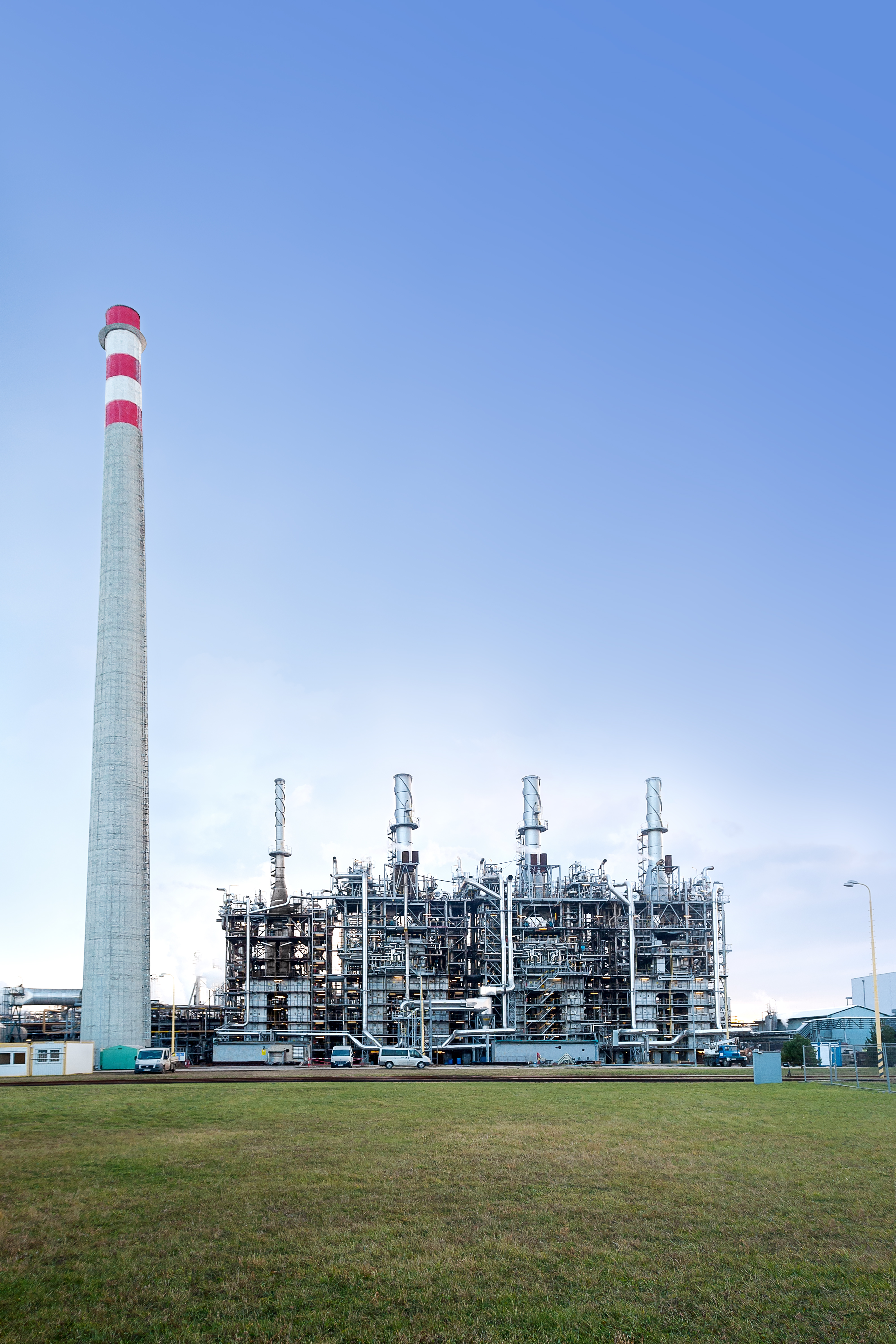
The shutdown and start-up of production units require activities whose accompanying phenomena may cause disturbance to residents living in the vicinity of the refinery. All material must be burned on field burners before production facilities are opened to prevent spillage into the surrounding area and endangering the health and life of people, the environment and property. The opening of the facilities themselves may be accompanied by the spread of odours, the intensity of which also depends on weather conditions. "Slovnaft is introducing new turnaround management principles through the Turnaround Excellence programme, which aim to reduce the time of planned turnarounds, and therefore to reduce the negative impact of activities on the refinery's surroundings," adds L. Noskovič. The company informs about the impact of the works on the comfort of residents on its website and in the mobile application Neighbour Slovnaft. In a separate section on the website, Slovnaft will regularly inform about the progress of the works of the summer part of the planned turnarounds.
The main supplier is the single service company Slovnaft Montáže a Opravy. Approximately 1,600 external workers will be involved in the turnarounds - mainly from engineering companies, but also electrical specialists and experts in measurement and regulation. Traditionally, Slovnaft will place great emphasis on occupational safety and health, including extensive fire safety measures. Internal safety coordinators will support the safe work of external workers directly at the production units. Slovnaft has also now prepared a well-established incentive programme for contractor workers, aimed at an accident-free course, which allows them to earn fuel cards.
This year's cycle of planned turnarounds is divided into three parts - spring, summer and autumn, with the summer part being the most extensive in terms of the volume of planned work. In total, Slovnaft is investing EUR 52 million in the maintenance of nearly 40 of its production units and facilities this year.
Watch a video about the summer part of the planned turnarounds:
About the SLOVNAFT, a.s. production zone
The refining and petrochemical part of the company in the south-eastern part of Bratislava covers an area of approximately 400 hectares. The production zone is divided into blocks with seven operational units, railway, logistics terminal, energy infrastructure and warehouses. Of the total area of the site, 270 hectares are grassed over and there are more than 10 000 trees growing there. Outside the main campus is a mechanical-chemical-biological wastewater treatment plant, which is one of the largest ecological structures in the region. SLOVNAFT, a.s. is one of the three most modern refinery-petrochemical complexes in Europe. The EFPA (Environmental Fuel Project Apollo) complex is key for the refinery and the petrochemical part includes the state-of-the-art LDPE4 n polyolefin complex for polyethylene production and the PP3 production unit where polypropylene is produced.
About SLOVNAFT Group
The SLOVNAFT Group is an integrated refining and petrochemical group. The key company of the Group is SLOVNAFT, a.s., which is mainly engaged in the processing of crude oil in one of the most complex European refineries and in the wholesale and retail sale of fuels. Slovnaft operates the largest network of petrol stations in the Slovak Republic. The company is one of Slovakia's leaders in CSR and corporate philanthropy, and significantly supports sports, culture, education, youth and environmental revitalisation. Forbes magazine ranked Slovnaft among the most valuable Slovak brands. SLOVNAFT Group is a member of the international MOL Group.
2022-04-01 MOL GROUP ACQUIRED REMAT, HUNGARY’S MARKET LEADING PLASTICS RECYCLING COMPANY
- MOL Group acquired ReMat Zrt., a Hungarian market leading plastics recycling company using communal and industrial waste for creating regranules
- Aligned with its strategic goal to become a leader in the low-carbon circular economy in CEE, MOL continues building a strong portfolio in the field of plastic recycling and waste integration
- MOL’s total capacity of recycled plastic material raised to 40,000 tons/year, together with the latest acquisition of Aurora Kunststoffe Gmbh in Germany
BRATISLAVA, 1 April 2022 - MOL Group acquired ReMat Zrt., a recycler with production plants located in Tiszaújváros and Rakamaz, Hungary, and a logistics hub in Bratislava, Slovakia. ReMat is a market leading plastics recycler in Hungary with an annual processing capacity of 25,000 tons and almost 200 employees. The transaction fits into MOL’s portfolio and its goal to become a key player in the low carbon circular economy in Central and Eastern Europe.
ReMat is Hungary’s market leader in plastics recycling, using plastic waste from communal and industrial sources. The company prepares a wide range of polyethylene and polypropylene regranules and tailor-made products. ReMat has automatic selecting system, cleaning and regranulating equipment from leading manufacturers that can process up to 25,000 tons annually. With this acquisition, MOL will be able to develop tailor-made virgin and recyclate solutions to fulfill the ever-increasing demand of its customers for circular materials.
MOL Group launched its “Shape Tomorrow” 2030+ Strategy in last February, fully integrated with a new sustainability strategy, and started to act already to deliver on it. One of the main pillars of the Strategy is integrating circular economy in MOL’s operation, the company will spend USD 1bn in the next 5 years on new circular economy and green projects. Waste integration and utilisation is a key element of the new sustainable approach.
”We need plastic for our everyday life, plastic is good, what we don’t like is untreated plastic waste that is polluting the planet. MOL has started to invest in the circular economy, because we all want to live in a better environment; and for that we need more recycled goods. In addition, there is an increasing need from our customers for recycled material so good cause meets here with good business opportunities. With that in mind, in the last couple of years we started to build a strong portfolio around recycling. And we won’s stop here: for a net zero economy, we also have to use all kinds of waste as a resource, in a much more clever way than how we do today. Our goal is to become a key player in the low-carbon circular economy in Central and Eastern Europe and this acquisition is a major step towards this fascinating goal” - said Gabriel Szabó, Executive Vice President of MOL Group Downstream.
“We have come a long way since our foundation and are incredibly proud to be a pioneer within Hungary’s plastic recycling industry. Over the last two decades we have invested into state-of-the-art facilities and constantly expanded our processing capacities capable of supporting Hungary’s obligations towards the European Union regarding plastic recycling. We are excited to be joining MOL and look forward to continuing to drive growth for this attractive business” -said László Olasz, CEO of ReMat.
MOL has implemented investments already and it is continuously seeking for the opportunities to grow the share of recycled materials in its product portfolio. In November 2019, the first step was taken with the acquisition of Aurora Kunststoffe GmbH, a recycled plastic-based compounder in Germany. With a total combined annual capacity of 40,000 tons of Aurora and ReMat, MOL can offer a wide range of sustainable compounds and regranulates for the automotive and packaging industries. MOL also entered into a strategic partnership with German company APK, a pioneer in the development of plastic recycling technology, whose solvent based process is capable of producing high-quality polymers from complex plastic waste. Recently, MOL entered into strategic partnership with Swiss Meraxis to forge ahead with the development and production of polyolefin re-compounds in the future. MOL is planning investments in the field of chemical recycling as well and taking serious steps towards further waste-management activities.
About ReMat
ReMat Zrt. is based in Tiszaújváros and its origins date back to 1995, when the company started collecting and selling plastic waste. In 1997, the company started its recycling business and today has a processing capacity of 25,000 tonnes. ReMat Zrt. is the market leader in its field and the company operates in Hungary and Slovakia.
2022-03-24 NEW PLANT UNDER CONSTRUCTION IN TISZAÚJVÁROS: A 65 BILLION CHEMICAL INVESTMENT BY MOL GROUP
- New propylene plant with HUF 65 billion investment will create competitive jobs in the long term
- With an annual production of 100,000 tonnes of propylene, the plant will cover a quarter of the MOL Group's total chemical needs
- The investment is part of MOL Group's updated strategy and represents a major step forward in its transformation into a chemical company
TISZAÚJVÁROS, 23 March 2022 - Official foundation stone laying ceremony of the new propylene plant of MOL Petrochemicals took place in Tiszaújváros. The plant is built as a greenfield investment for 65 billion HUF and will produce 100.000 tons of propylene, covering a significant rate of MOL’s chemical material need, increasing the self-sufficiency of the company.
This plant will provide propylene for the polyol complex already under construction, turning Tiszaújváros into the chemical capital of the region. Building of the propylene plant provides thousands of job opportunities and creates competitive workplace in the long run.
The construction of the new propylene plant integrates well into MOL Group's updated SHAPE TOMORROW 2030+ strategy, since with the help of this development the company can constantly increase the ratio of non-fuel products in its portfolio. MOL Group provides approximately USD 4.5 billion for investments that will turn Tiszaújváros into the main chemical capital of the region. The new plant has an important role in the course of developments, since it will provide stable supply of materials in three product lines of MOL Petrochemicals. The 100.000 tons of propylene provides a quater of the company's total need.
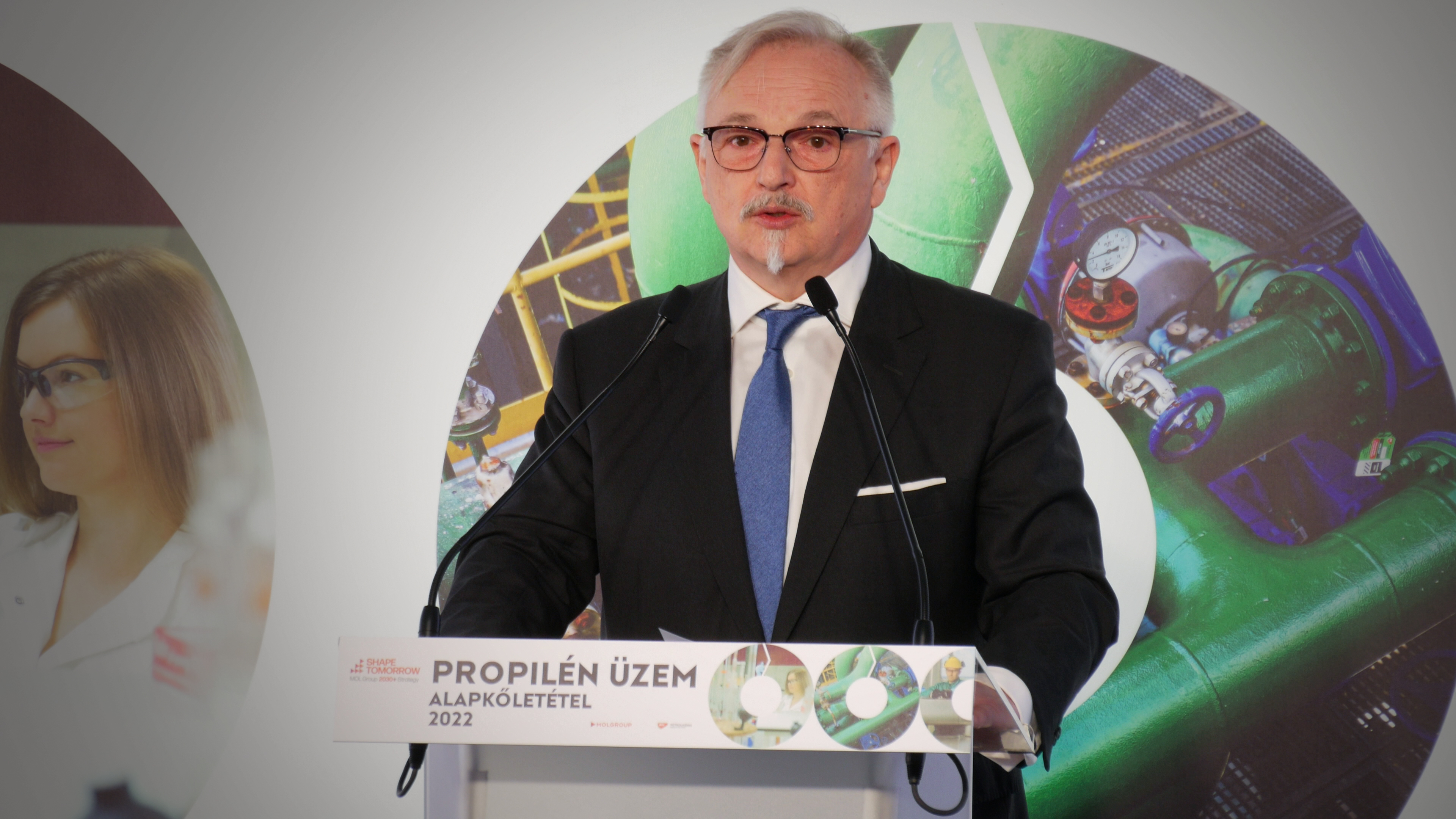
Photo: Zsolt Hernádi, Chairman-CEO of MOL Group
„In the last 5-10 years MOL has turned Tiszaújváros into a unique chemical center so by now the city is undoubtedly considered among the most modern petrochemical metropolises. We have a butadiene plant already built here, as well as a synthetic rubber plant that was built in cooperation with Japanese experts, and the town also hosts the largest industrial investment of the last 30 years, the polyol complex built for EUR 1.3 billion"– said Zsolt Hernádi, Chairman-CEO of MOL Group. He highlighted that with the construction of the propylene plant, MOL has reached an important milestone on the road of chemical transformation and energy transition. „This plant strengthens our self-supply capacity which is of great value for the whole country. From time-to-time history proves: we have to do everything to avoid depending on others" – he added.
Building the plant provides job opportunities for several thousands of people, the ratio of Hungarian contractors reaches approximately 50%. According to plans, the plant will start its operation in 2024 and it creates around 30-40 new competitive workplaces in the long run.
The investment represents the next milestone of a several year-long process: MOL Group is running several developments in Tiszaújváros. The butadiene extraction unit and the synthetic rubber plant are already operating, and building the polyol complex is in its final stage as well, which is one of the greatest domestic industrial investments. Additionally, the process of modernization and extending the life of the Olefin-1 plant is also progressing well, which is currently the biggest efficiency improvement program on existing equipment in Hungary.
The Hungarian Government is supporting the investment with HUF 5 billion. At the ceremony, Péter Szijjártó Minister of Foreign Affairs, Zsolt Hernádi Chairman-CEO of MOL Group and Zsófia Koncz, Member of the Hungarian Parliament laid down the foundation stone of the plant.
2022-03-11 UNIQUE BIODIESEL COMPONENT PLANT BUILT BY ROSSI BIOFUEL AND MOL GROUP IN KOMÁROM
- Capacity 50 000 tonnes of biodiesel per year
- State-of-the-art technology, unique in Europe
- 85% greenhouse gas savings compared to conventional fuel
- The investment is in line with MOL Group's 2030+ "SHAPE TOMORROW" strategy
KOMÁROM, 11 March 2022 - The new plant of Rossi Biofuel in Komárom was inaugurated, which will significantly increase the biofuel production volume in Hungary. With this investment, MOL Group and Envien Group launched a technology in Europe that can boost greenhouse gas savings by more than 85 percent.
The advanced biodiesel plant of Rossi Biofuel Zrt. Was inaugurated, which will significantly increase the company's annual production and the biofuel production volume in Hungary with a capacity of 50,000 tons per year. The plant is the first in Europe to use the RepCat technology of the Austrian BDI-BioEnergy International GmbH, which is highly flexible in terms of raw materials: it also allows the processing of greasy wastes of different types and origins, such as used cooking oils, trap grease, animal fats or residues from vegetable oil production. Biodiesel produced in this way is one of the most climate-friendly fuels.
„We have brought a unique technology to Europe that allows us to produce biofuel from almost any type of fats. This is a huge success for all of us, as circular economy is one of the cornerstones of MOL Group's updated strategy. We have made a commitment to recycle waste in an efficient way, and to meet the world's growing energy needs with increasingly sustainable solutions. Energy transition is a long and complex process, but this investment clearly shows that conventional fuels can be turned into more environmentally friendly with the right technology and by using waste" – said Oszkár Világi, Deputy Chief Executive Officer of MOL Group.
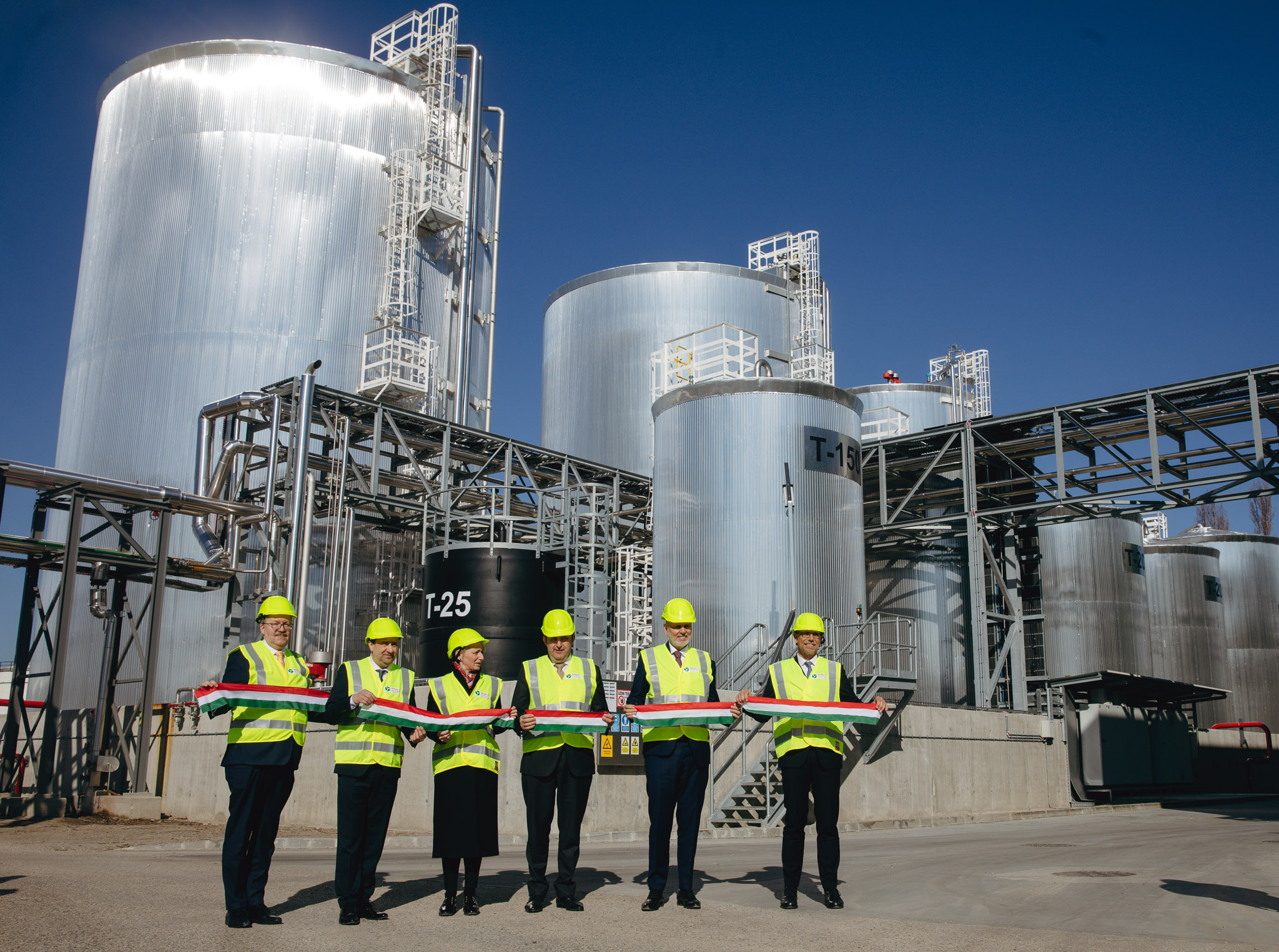
Photo: Plant opening ceremony
With the construction of the plant, the MOL Group and Envien Group, the 25-75% owners of the company, are aiming to respond to both consumer and regulatory demands: the aim is for Rossi Biofuel to comply with EU rules on renewable transportation fuels. Rossi Biofuel's product is used as a bio-component in the production of diesel at Danube Refinery and Slovnaft refinery.
„This new modern plant is the Envien Group's first major investment in the production of advanced biofuels, where waste is processed into useful products. In our opinion, a plant that uses waste and mainly domestic raw materials, contributes to the greenhouse gas savings of transport and at the same time boosts and stimulates the local economy and employment, a way forward and a priority for the group. Due to the Hungarian subsidies, we decided to locate the plant in our production base in Komárom, Hungary, and we are confident that this is not our last project of this kind" – said Ing. Robert Spišák, PhD., Chairman of the Board of Rossi Biofuel.
The foundation works of the €45 million brownfield plant started in June 2020. More than 15 companies were involved in the construction work, with an average of 80 workers, but at certain times it could reach 150-170 workers. The state supported the investment with interest subsidies and a corporate tax credit, which doubled the number of Rossi Biofuel employees to over 100. The new plant was inaugurated by Dr. László Palkovics, Minister of the Ministry for Innovation and Technology, Dr. Judit Bertalan Czunyiné, Member of Parliament, Ing. Robert Spišák, PhD., Chairman of the Board of Rossi Biofuel Zrt. and Dr. Oszkár Világi, Deputy CEO of the MOL Group.
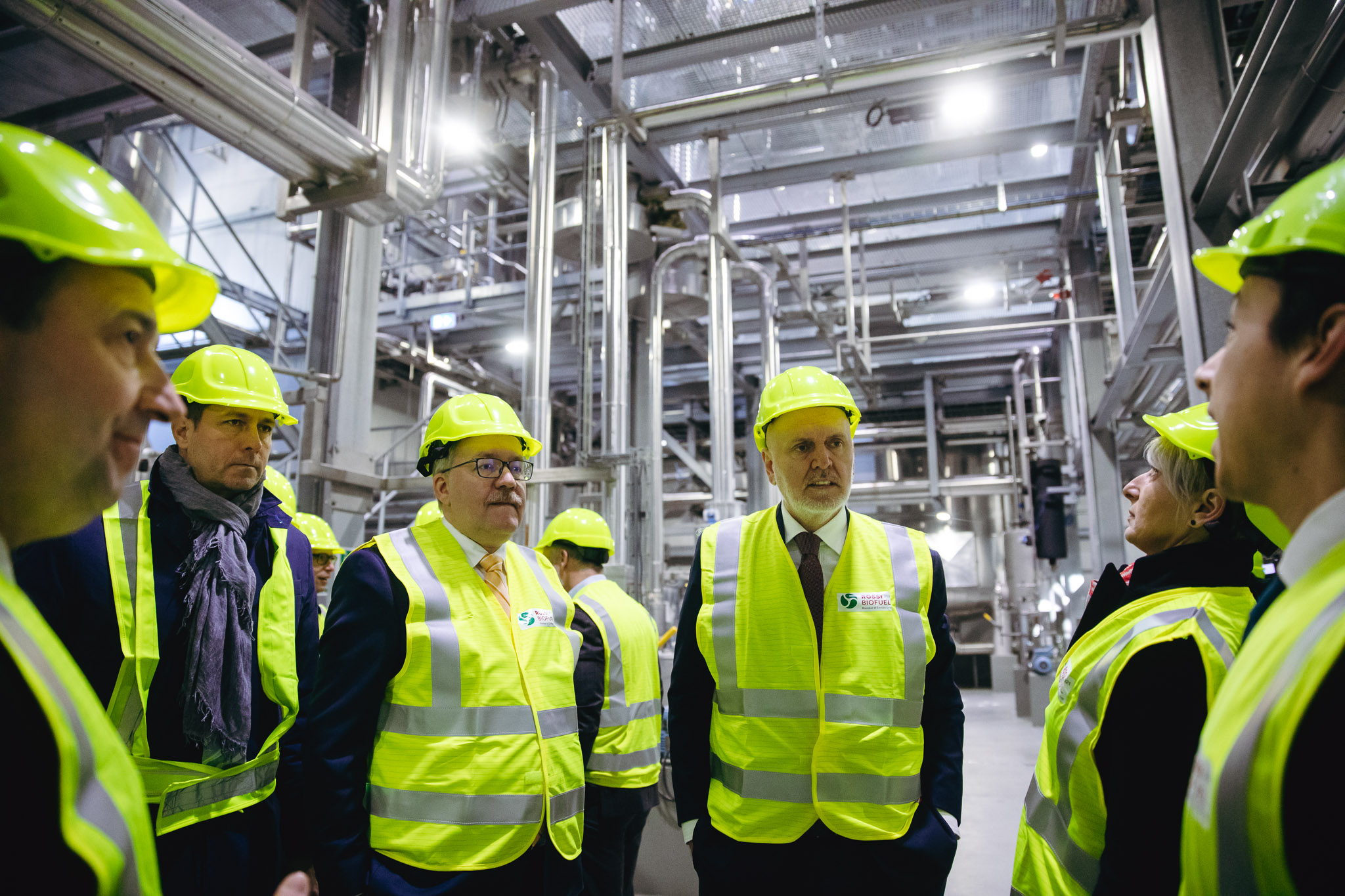
Photo: New plant in Komárom
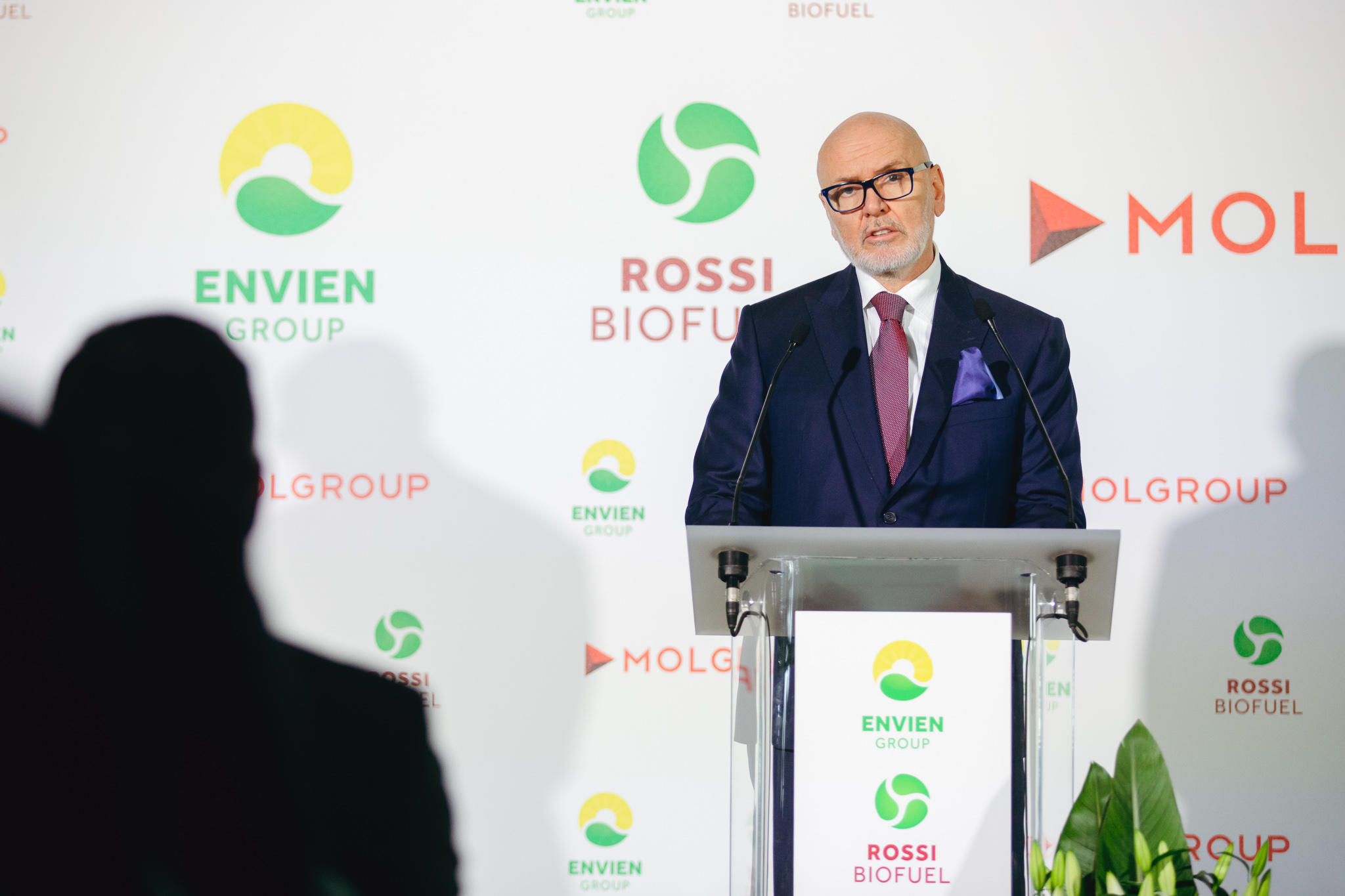
Photo: Dr. Oszkár Világi, Deputy CEO of MOL Group

Photo: Ing. Robert Spišák, PhD., Chairman of the Board of Rossi Biofuel Zrt.
About Rossi Biofuel
Rossi Biofuel Zrt. is part of the Envien Group, which plays a key role in the production of biodiesel in the region. Rossi Biofuel Zrt.'s biodiesel plant is located within MOL Nyrt.'s industrial base in Komárom. The plant was established as a greenfield investment in 2006 and started production in December 2007. The main activity of Rossi Biofuel Zrt. is the production of biodiesel from vegetable oils and used cooking oil, mainly harvested within the region.
Envien Group is one of the largest and most important groups of companies in the CEE region active in the production of biofuels used in blends with conventional diesel and gasoline. The Group consists of ten member companies in five European countries - Slovakia, Czech Republic, Hungary, Switzerland and Croatia.
2022-03-01 SLOVNAFT INVESTS EUR 52 MILLION IN PLANNED MAINTENANCE OF PRODUCTION FACILITIES THIS YEAR
- Slovnaft has planned maintenance of half of its production facilities for this year, with a total value of EUR 52 million.
- The spring part of the planned mandatory shutdowns of production facilities will take place in March, the others will be in summer and autumn.
- The company has changed the system for preparing and carrying out overhauls to make them as short as possible and to minimise their impact on the surrounding area.
- Residents can find all the information about what is happening at the refinery in the mobile app Sused Slovnaft.
BRATISLAVA, March 1st 2022 - Slovnaft will start planned maintenance of part of its production facilities next weekend. This is the first part of the planned mandatory shutdowns this year, which are to affect almost half of the production facilities. The company is investing a total of EUR 52 million in mandatory maintenance, repairs and technology upgrades to improve the safety of their operation and the environmental impact of production. The overhauls of production facilities will take place in three time blocks - spring, summer and autumn. Domestic and foreign external contractors will be involved in the cleaning, inspection and repair of refinery and petrochemical facilities. Customer supplies will not be affected during the shutdowns.
"We started working on this planned maintenance two years ago. The process of managing planned outages is very complex. It involves more than 15 different Slovnaft departments and more than 300 internal staff," says Lukáš Noskovič, Project and Planned Outage Management Manager.
The spring part of the compulsory maintenance will start this weekend and will involve 1100 external specialists in addition to Slovnaft employees. During this phase, Slovnaft will shut down nine production units and the following six will be idle. The shutdown of most of them is scheduled for March 5th 2022, with all work to be completed and the manufacturing units restarted in early April.
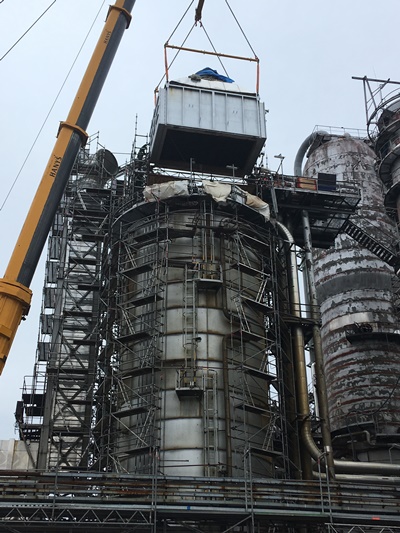
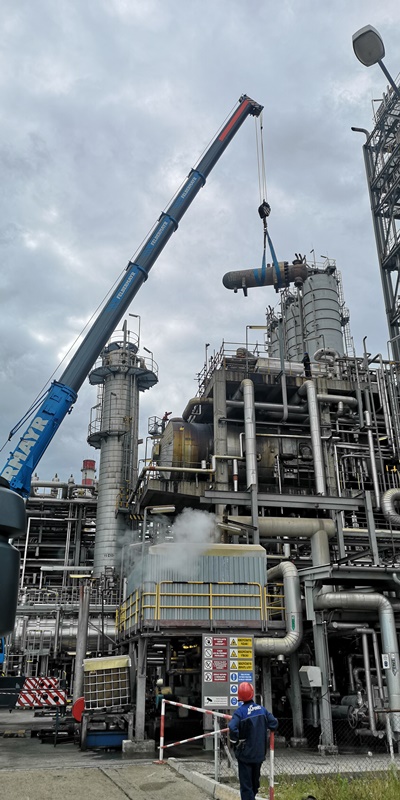
The spring process shutdowns are preferably aimed at cleaning the equipment, which in turn reduces the energy intensity of the oil refining processes. This means lower consumption of both natural and refinery gas with a direct impact on reducing the environmental burden.
The safe shutdown and restart of production facilities are accompanied by activities that may be perceived as sensitive by nearby residents. These include the burning of materials on field burners, which causes radiation or increased noise. The opening of facilities for inspection and cleaning may be accompanied by the spread of odours. Its intensity also depends on weather conditions. The company has planned all work and activities to minimise their impact and effects on the population in the vicinity of the refinery. This is also facilitated by the Turnaround Excellence (TEX) programme, which the company has developed in collaboration with external consultants.

"TEX allows us to take all the necessary steps in advance to avoid risks in the implementation phase. Thanks to the programme, downtime has been reduced to the minimum necessary," adds Lukáš Noskovič.
Slovnaft publishes all information about planned works on its website and is also available in the mobile app Sused Slovnaft.
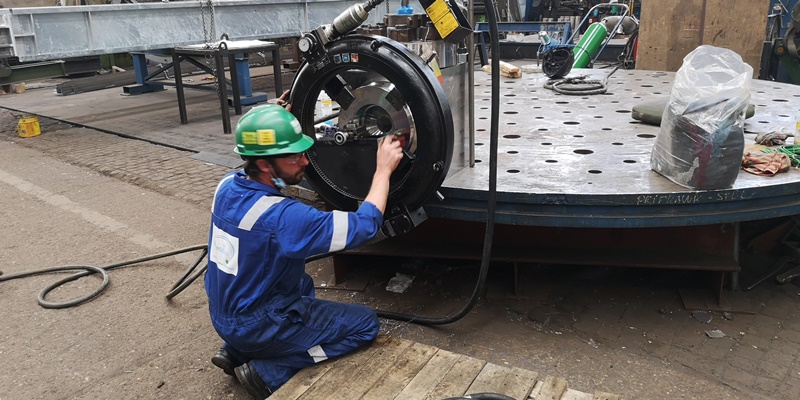
Slovnaft, as an important part of critical infrastructure, has long had strict anti-pandemic measures in place and during shutdowns they will also apply to all external contractors working in the production area. The summer part of the shutdowns is subsequently scheduled from the end of May to the end of July. Sixteen production units will undergo general overhauls, another three Slovnaft units will be put on technical hold and three production units will be upgraded. In the final autumn part, one production unit is scheduled to be overhauled and one follow-up unit will be in downtime.
Watch the video about the planned shutdowns:
2021-02-24 MOL Group to launch updated, integrated long-term strategy
- MOL builds on the changes of the external environment and updates its 2030 strategy, integrates it with sustainability goals.
- MOL keeps key initiative as they proved to be progressive and successful, but now accelerate business transformation
- MOL will transform its traditional businesses for the low-carbon future by making them even more efficient and focused. Downstream will become a highly efficient, sustainable, chemical focused leading downstream player, Consumer Services will become a best in class digitally driven consumer goods retailer, and Upstream will also be a more efficient and sustainable, value-generating strategy pillar.
- Updated strategy, “SHAPE TOMORROW” MOL Group 2030+ focuses on CO2 reduction, efficiency and the circular economy
- MOL speeding up its transformation to become a net-zero CO2 emitter by 2050
- By 2030, every second USD will be spent on sustainable projects, while 100% of spending will be green by 2050
- MOL will spend USD 1bn in the next five years on new, low-carbon and sustainable businesses to become a key player in Central and Eastern Europe circular economy: waste integration and utilization, carbon capture, utilization and storage, advanced biofuel production and hydrogen-related opportunities
Budapest, 24 February 2021 - The Board of Directors reviewed and approved “MOL Group 2030+”, an update of the company’s long-term strategy – which was originally announced in October 2016 – fully integrated with a new sustainability strategy and complemented with a longer-term vision and ambitions beyond 2030.
”The MOL 2030 long-term strategy has so far proved to be progressive, credible and directionally correct. Accordingly, MOL has taken important strategic steps in the right direction over the past five years. However, we have observed an unprecedented pace of changes around us recently, including rapid progress in the green energy transition. Our updated strategy seeks to accelerate our transition process to enhance MOL’s resilience and our ability to shape a sustainable future. We will sharpen our focus, increase our efficiency further, while seeking new opportunities with a new determination. One thing has not changed since 2016: we remain deeply committed to the transformation of our traditional fossil-fuel-based operations into a low-carbon, sustainable business model.” (Zsolt Hernádi, Chairman-CEO)
Strategic transformation directions in existing businesses confirmed. With an unchanged vision of the structural, long-term decline in fossil motor fuel demand in Europe and in CEE, MOL will continue and accelerate its fuel-to-chemicals transformation in Downstream growing to become a leading sustainable chemicals company in CEE. MOL has unchanged ambitions in Consumer Services to become a market-leading, best in class digitally driven consumer goods retailer and complex mobility service provider in the region.
“One of MOL’s core strengths lies in its resilient, uniquely balanced, integrated business model. In order to preserve this resilience and to be able to shape our future, we will have to continually adjust our business portfolio to meet the challenges of a future carbon-constrained economy.” (Zsolt Hernádi, Chairman-CEO)
Downstream: transforming into a highly efficient, sustainable, chemicals-focused leading industry player. MOL Downstream will retain its top-tier cash generation position in European refining and targets USD 1.2bn+ EBITDA by 2025, supported by an additional USD 150mn of efficiency improvement. The fuel-to-chemicals transformation will continue at full speed to reduce motor fuel yield in the refining system and to convert 1.8mn tons to petrochemical feedstock by 2030. This will be achieved through two investment cycles using highly efficient technologies and targeted start-up dates in 2027 and 2030, respectively. At the same time, MOL will increasingly integrate circular technologies into its core businesses, using bio- and waste-based streams in production, scaling up recycling and utilizing CCS opportunities with a clear focus on materially reducing the segment’s CO2 footprint. The total Downstream transformation capex may reach USD 4.5bn in the next ten years.
Consumer Services: becoming a best in class digitally driven consumer goods retailer and an integrated, complex mobility service provider by 2030 with significantly higher revenues and free cash flow. Consumer Services will materially increase its contribution to the group by reaching over USD 700mn annual EBITDA by 2025 and a cumulative simplified free cash flow of over USD 2bn in 2021-25. The segment will invest in the further development of food and convenience offerings and will continue the standardization and digitalization processes within the network. Our focus will then increasingly shift towards sales channel diversification, expanding the alternative fuels portfolio and complex mobility platforms and services.
Upstream (E&P): focus on cash generation, managed decline in CEE, approach international E&P opportunistically and invest in CCUS. Existing resources will continue to be managed to maximize cash generation and value creation with around USD 1.8bn simplified free cash flow in 2021-25 at USD 50/bbl oil prices (and assuming no inorganic reserve replacement). This requires the cost-conscious and efficient management of the CEE production decline and an active, but opportunistic approach to international E&P without setting any volumetric targets. MOL aims to utilize its expertise in the Pannonian basin geology to become a key player in carbon capture, utilization and storage (CCUS) in CEE by 2030, which will also support it becoming carbon-neutral (Scope 1 and 2).
“Sustainability and profitability are not mutually exclusive concepts; they have to go together. You cannot be sustainable without generating revenues, nor can you be profitable without focusing on how those revenues are generated; they go hand in hand. This has been evident for some time and will increasingly be clear to everyone in the future. We all want to live in a better, safer and cleaner world; and for a better and more sustainable world we need to shift to a low-carbon, circular economic model.” (Zsolt Hernádi, Chairman-CEO)
Investing in new businesses to shape a low-carbon circular economy. MOL wants to significantly increase its EU Taxonomy-aligned climate-friendly investments to exceed 50% of total capex by 2030 and to approach 100% by 2050, or earlier. MOL also wants to play a key role in shaping the low-carbon circular economy with investments in new businesses such as waste integration and utilization, recycling, carbon capture, utilization and storage (CCUS), advanced biofuels and potentially hydrogen-related opportunities. In the next five years, MOL will spend USD 1bn on new, low-carbon and sustainable projects to become a key player in CEE in the circular economy.
Significant carbon reduction targets by 2030, fully aligned 2050 ambitions with the EU Green Deal. In line with the Paris Agreement and the need for globally coordinated efforts to limit global warming and climate change, it is also the role of MOL to contribute to the decline in carbon emissions from its value chain and operated assets. Accordingly, MOL will reduce group-level emissions by 30% by 2030, make both E&P and Consumer Services carbon-neutral (in terms of Scope 1 and 2 emissions) by 2030, while Downstream emissions (Scope 1 and 2) will be reduced by 20% by 2030 (from a 2019 base) for existing operations. MOL also shares the EU’s ambition to be climate-neutral by 2050 in terms of all (Scope 1, 2 and 3) carbon emissions and wishes to actively participate in the industrial revolution required to make Europe carbon-neutral, both on its own and in partnering with others.
”The key element for the success of a large company, like MOL, is to maintain its ability to attract, develop and retain talent. Our talented people are by far our most valuable assets, and they are also the core assets of any successful economy. Managing a complex transformation as the one MOL has embarked upon requires not only a diverse and inclusive workforce. It also needs strong collaboration with our local communities, partners, regulators, ensuring the involvement of practically every layer of the society so that we can accomplish the mission of the green energy transition.” (Zsolt Hernádi, Chairman-CEO)
A comprehensive sustainability framework sets targets along all four pillars: People and Communities; Health and Safety; Integrity and Transparency; Climate and Environment. MOL sees Diversity and Inclusion as one of its key values and strategy enablers with targets to increase female participation at all levels, reaching 30% in managerial positions and focusing on broader employee wellbeing and health. Our sustainable employee engagement score will stay above 75; community engagement will intensify so that we become a trusted partner; Total Recordable Incident Rate (TRIR) will fall below 1.0 by 2025. We will instigate a new responsible procurement strategy across the group by the end of 2022; awareness of ethics and human rights will be further promoted among employees and management; and negative environmental impact (beyond CO2) will be further reduced.
“Any transformation is an inherently complex, lengthy and often painful exercise. I am convinced, however, that our refreshed long-term strategy will keep us on the right track to develop into a key player of the low-carbon circular economy, offering exciting opportunities to our employees, continuously enhancing customer experience, working constructively with our partners whilst ensuring a stable, predictable income to our investors along the entire transformation journey.” (Zsolt Hernádi, Chairman-CEO)
Financial Framework 2021-25: fully funded transition and stable, predictable shareholders remuneration, strong balance sheet. Even with conservative mid-term base macro assumptions MOL will generate sufficient operating cash flows in 2021-25 – with EBITDA rising from USD 2.3bn in 2021 to USD 2.6bn in 2025 – to cover “sustain” capex, at least USD 3.5bn strategic capex, including USD 1bn new, low-carbon, circular economy investments, and stable base dividends. Keeping a strong financial profile through a robust balance sheet and ample financial headroom remains a priority. This flexibility may be used to fund new business opportunities, including cash-generative M&A in any business lines.
About MOL Group
MOL Group is an integrated, international oil and gas company headquartered in Budapest, Hungary. It is active in over 30 countries with a dynamic international workforce of 25,000 people and a track record of more than 100 years in the industry. MOL’s exploration and production activities are supported by more than 75 years’ experience in the hydrocarbon field. At the moment, there are production activities in 9 countries and exploration assets in 14 countries. MOL Group operates three refineries and two petrochemical plants under integrated supply chain management in Hungary, Slovakia and Croatia, and owns a network of almost 2,000 service stations across 10 countries in Central & South Eastern Europe.
Press contact: @internationalpress@mol.hu

2021-02-19 MOL Group 2020 results: solid performance in a very challenging year
- Full-year 2020 EBITDA reached USD 2.05bn, above the latest, post-COVID guidance (of around USD 1.9bn), but decreased by 16% compared to last year, affected by the pandemic and economic crisis
- Clean CCS EBITDA came in at USD 464mn in Q4 2020, 23% lower year-on-year reflecting the weaker oil macro
- Upstream production volume increased by 8% in 2020 to 120 mboepd thanks to the contribution of ACG, yet EBITDA decreased by 34% year-on year due to the extremely weak external price environment
- Downstream Clean CCS EBITDA decreased in Q4 to USD 133mn, hit by depressed refinery margins and the usual Q4 seasonality. Full-year result was 15% lower than a year ago.
- Consumer Services EBITDA rose by 23% in Q4 2020 to USD 128mn, the segment generated an all-time high USD 510mn EBITDA in full year 2020, 8% higher than in 2019
- 2021 EBITDA guidance at around USD 2.3bn as some macro recovery expected
Budapest, 19 February 2021 – Today, MOL Group announced its financial results for 2020. Despite the much challenging pandemic and economic crisis, MOL Group generated USD 464mn Clean CCS EBITDA in Q4, bringing full-year Clean CCS EBITDA to USD 2.05bn, above the updated guidance. In a year of disruption, volatility and uncertainty, all segments generated positive simplified free cash flow that resulted in USD 636mn in 2020, higher than a year ago. Organic capex was at USD 1.41bn in 2020, in line with the guidance (up to USD 1.5bn). MOL expects 2021 EBITDA at around USD 2.3bn as macro likely recovers.
Chairman-CEO Zsolt Hernádi commented the results:
“We delivered over USD 2bn EBITDA in 2020, and while earnings were lower compared to 2019, our fast and timely reaction to the crisis allowed us to generate even stronger free cash flow than our pre-Covid guidance. This was only possible with each and every business line having cash positive operations even in a year of major disruption.
2020 was an unprecedented year with never seen challenges. I am very proud of all our colleagues, as our operations were running uninterrupted even amidst the biggest crisis, we continued to be a reliable partner of all our customers and partners and we were able to continue all our strategic investments, although unfortunately they slowed down a bit due to the mobility restrictions. Even under major stress we are not losing sight of our vision and we will be doubling our efforts in 2021 to progress with our business transformation.
We expect 2021 to be a year with some normalization and recovery, which is also behind our rising EBITDA guidance of USD 2.3bn. Our capital investments also need to catch up, so our organic capex shall be at around USD 1.7-1.9bn, once again implying a fully funded business with positive free cash flow.”
Upstream EBITDA declined in Q4 to USD 181mn, affected by technical adjustments related to ACG, MOL’s new asset in Azerbaijan. The quarter brought the segment’s full-year EBITDA to USD 689mn that is 34% lower than a year ago, as sharply lower oil and gas prices were only partly offset by the contribution of ACG that helped full-year production volumes to rise by 8% compared to last year. Proved and probable reserves increased to 364 mboepd by the end of 2020 (from 270 mboepd end-2019), reflecting the ACG contribution and net upward reserve revision in the portfolio, implying 312% reserve replacement.
Downstream full year 2020 Clean CCS EBITDA dropped by 15% to USD 740mn, reflecting the weak macro environment, while Q4 result came in at USD 133mn, hit by depressed refinery margins and the usual Q4 seasonality. Refined products sales volumes dropped by 14% compared to last year’s Q4 result, affected by the second wave of the pandemic. The polyol project exceeded 75% overall completion at the end of Q4. Due to the pandemic, MOL together with the engineering, procurement and construction contractor estimates that the project completion will be shifting to the second half of 2022 (originally in H2 2021) and as a result of the delay the total capital expenditure may increase to around EUR 1.3bn (originally EUR 1.2bn).
Consumer Services EBITDA growth accelerated in Q4 to +23% and EBITDA rose to USD 128mn compared to last year, mostly driven by higher fuel contribution and lower operating expenses. The segment generated an all-time high USD 510mn EBITDA in full-year 2020 that is 8% higher than the result in 2019. Simplified free cash flow more than doubled in Q4 and jumped by 28% in 2020 year-on year to USD 381mn. The non-fuel concept rollout continued despite the pandemic: the number of reconstructed sites with Fresh Corners rose to 955 from 877 at the end of 2019.
The Gas Midstream segment reached USD 201mn EBITDA in 2020, 8% higher than a year ago. In Q4, EBITDA fell by 41% year-on year to USD 42mn, as a result of materially lower cross-border capacity bookings and hence lower regulated revenues, decreasing transit revenues and higher operating expenses.
About MOL Group
MOL Group is an integrated, international oil and gas company, headquartered in Budapest, Hungary. It is active in over 40 countries with a dynamic international workforce of 25,000 people and a track record of more than 100 years in the industry. MOL’s exploration and production activities are supported by more than 75 years’ experience in the hydrocarbon field. At the moment, there are production activities in 9 countries and exploration assets in 14 countries. MOL Group operates four refineries and two petrochemicals plants under integrated supply chain management in Hungary, Slovakia and Croatia, and owns a network of almost 2,000 service stations across 10 countries in Central & South Eastern Europe.
Press contact
2021-01-19 Svitko showed speed, courage and humanity at the Rally
• The most successful Slovak racer won the 8th place in the general ranking of Dakar
• In the toughest races in the world Svitko had the official status of "Dakar Legend"
• According to Svitko, this year's Dakar was fast, wild, but safer compared to the previous year
BRATISLAVA, January 17, 2021 – The three-time European champion, multiple Slovak champion in enduro and cross country and the most successful Slovak motorcycle rider Štefan Svitko returned from Saudi Arabia on Saturday night, January 16, 2021. For the twelfth time he raced at the most prestigious race in the world, the Dakar Rally, in the colours of the Slovnaft Rally Team. In the list of motorcycle racers, the organizers have marked his name with the label of the official "Dakar Legend", status which only a few world riders have earned.
Štefan Svitko once again confirmed that he is prepared for the most extreme races in the world physically, mentally and technically. After the two-week race Svitko won the 8th place in the general ranking. He thus improved his good performance from last year, when he took 11th place among the world's top riders. He is pleased to confirm his position in the elite TOP 10. "I wanted to drive well in every stage and to give a balanced performance during the whole rally, which I managed to do. This year’s Dakar was safer compared to last one. Not only thanks to a better organization, but especially due to the safety measures that applied on the Dakar for the first time. I fell with an airbag vest myself and I also witnessed the falls of some other riders." Svitko helped the injured Argentinian Luciano Benavides in the 9th stage, which led through a rocky terrain and was marked by a number of falls. The Argentinian broke his arm during the fall and Svitko waited with him until the arrival of the helicopter with the doctor.
„After last year's tragedy of Paul Goncalves and Edwin Straver, this year the organizers not only provided us with inflatable vests, but we were equipped with warning signals and speed limits of 90 km / h applied on some sections of the track. All this had not only a physical but also a psychological effect.“, added Svitko.
In each of the 12 stages of Dakar, Svitko was in the elite group of 20 fastest riders. He has not remembered such a balanced and consistent performance ever since his beginnings at the Dakar Rally. „This year I had almost no performance fluctuations in the individual stages. I knew what I wanted and I went my way aiming to reach the best possible racing position,“ adds Svitko.
Extremes of this year’s Dakar did not surprise Svitko even in terms of fitness nor health. Again, it was a great adventure, despite strict anti-pandemic measures. „The condition for the start was to have negative tests and the organizers kept us in the separate "bubble" all the time. On the spot we have already focused exclusively on racing. The sandy terrain is always demands a great fitness. I'm not at all surprised that I came back three kilograms thinner. But I'll catch up fast at home. I am now in mandatory quarantine, which I will use for resting.“
Svitko again rode a KTM 450 Rally Replica motorcycle this year. During the desert race, he was assisted by his long-time mechanic Zlatko Novosád.
„From a technical point of view, we had a good year. There were no serious disturbances, despite the dusty environment,“ says Zlatko Novosád.
This year the Slovnaft Rally Team had a new member at Dakar. For the first time a woman took part in the team - Daniela Ozanová was in charge of logistics. This was not her first presence at Dakar, in the past she has already joined the race with the Polish team. „This year's Dakar tasted a little differently than in the past. Števo is among the world's top motorbike riders and has respect among them. We can't compare the size of our team with large factory teams, but with our coordination we were able to compensate for it,“ says Daniela Ozanová.
This year's Dakar started on January 3, 2021 in Jeddah, Saudi Arabia, and ended on January 15, 2021 in the same city. All special sections within the stages were completely new compared to the previous year. The route led from Jeddah to the north through the inland. About halfway through the race, the route continued south, copying the Red Sea coast.
Since his premiere at the Dakar in 2010, Štefan Svitko has started in all years of the race with the support of Slovnaft. He finished thirteenth in the motorcycle category in his first Dakar and became the most successful newcomer. The following year, due to a motorcycle failure, he did not complete the eighth stage and had to resign. Two years later, he had an unpleasant fall and withdrew from the competition only three stages before the finish. In 2013 he was ninth, and in 2012 and 2015 he took fifth place. In 2016, he triumphed in a fantastic 2nd place. In 2018, after falling in the 10th stage and a shoulder injury he was forced to end the Dakar race prematurely. In 2019 he had to withdraw from the race due to a motorcycle failure, but last year he finished in 11th place overall. In Dakar, Svitko is a highly respected motorbike rider and part of the world's elite.
www.facebook.com/StefanSvitkoFanklub



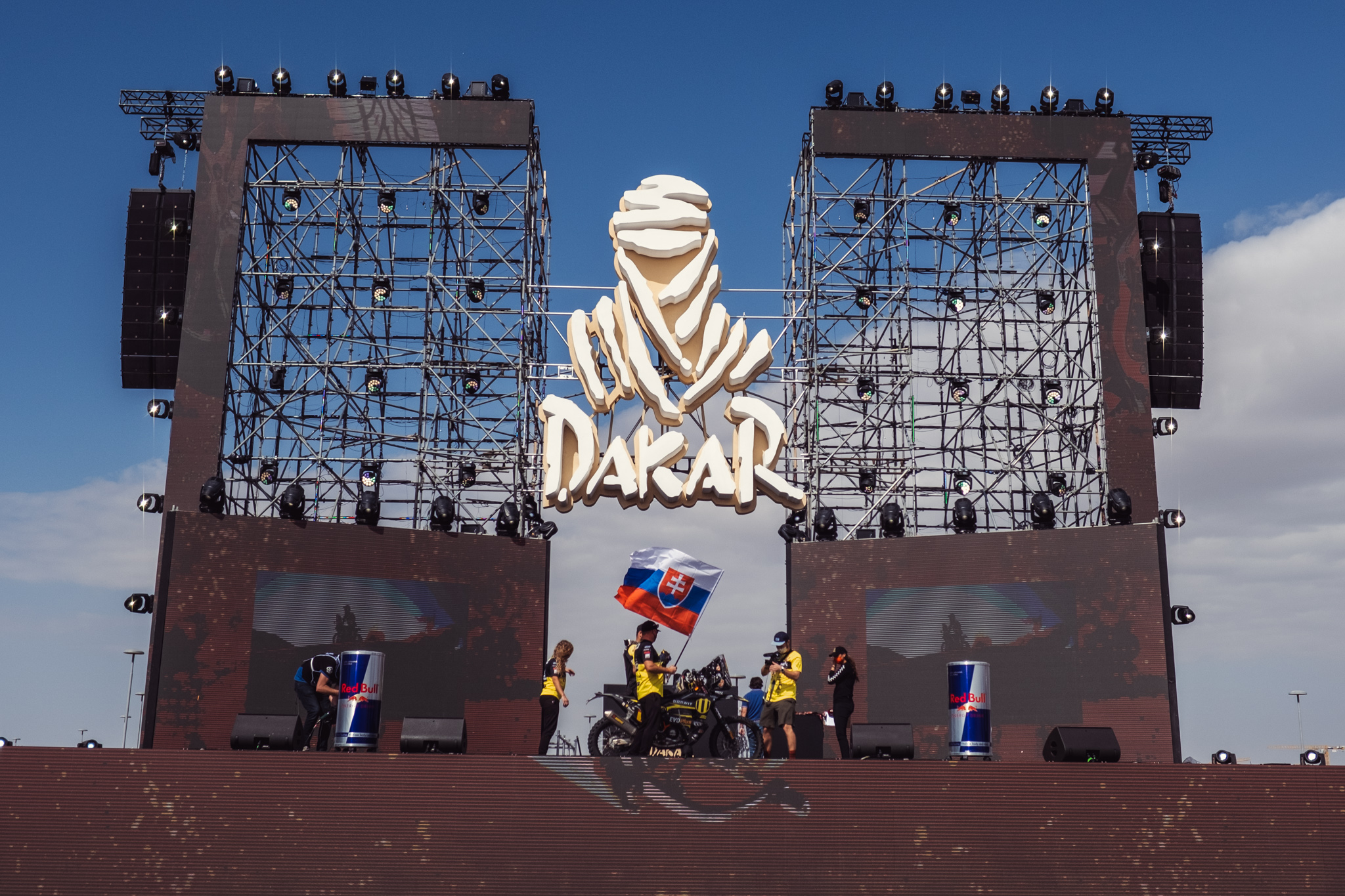

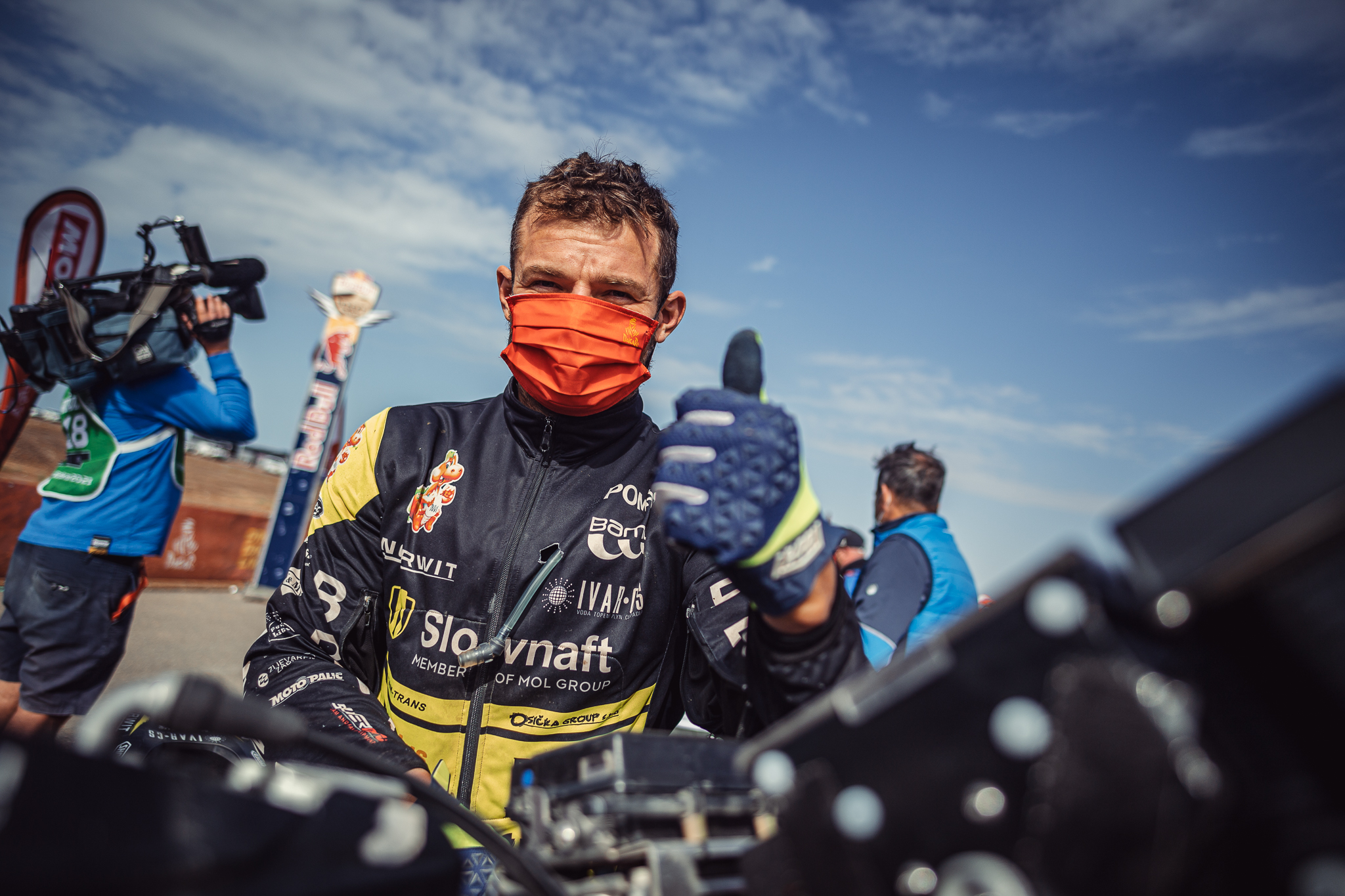
2020-11-30 Slovnaft remains a partner of art and culture even in difficult times
Art and culture in Slovakia have found themselves in a difficult situation this year due to the pandemic. Theatres are without audiences, but they continue to work and are preparing to reopen. As a long-time patron of culture, Slovnaft has decided to at least symbolically express its support for the nine theatres and one gallery with which it has been collaborating. It has distributed EUR 30,000 between them.
The financial support will be given to the Bratislava Puppet Theatre, the Small Stage STU Theatre, the Jókai Theatre, the New Nitra Theatre, the Žilina Municipal Theatre, the Ľudovít Fulla Gallery in Ružomberok, the Thália Theatre, the Košice State Theatre, the Spiš Theatre and the Prešov National Theatre. Slovnaft has been collaborating with most of them for many years within the ‘Culture with Slovnaft’ project, which aims to bring art closer to children.
“The anti-pandemic measures have also affected our ‘Culture with Slovnaft’ project. Nevertheless, we want to keep it going, albeit in a different form. We have decided to distribute the funds for this project for 2020 among the cultural institutions to help them overcome the difficult times,” said Oszkár Világi, Chairman of the Board and CEO of SLOVNAFT, a.s.
Since 2012, Slovnaft has been implementing the ‘Culture with Slovnaft’ project, which was created in an effort to help primary schools make greater use of the cultural vouchers provided by the Ministry of Culture of the Slovak Republic. In the 7 years of the programme’s existence, Slovnaft has reimbursed primary schools in smaller towns and villages for the cost of transporting pupils to culture in the amount of almost EUR 250,000, thanks to which more than 41,000 schoolchildren visited theatre performances and a gallery.
The theatres and gallery will use the funds to maintain their artistic activities or to cover part of their overhead costs. For example, the Spiš Theatre will spend them on two productions, the Jókai Theatre on the staging and preparation of a play for children and young people, and the Thália Theatre on a professional recording of two plays so that they can also be presented online. The Small Stage STU Theatre will use the money to cover its operation during the rehearsal of a stage production, the Bratislava Puppet Theatre to create a new production, and the Prešov National Theatre to cover its operating costs and co-finance the preparation of two productions. The Ľudovít Fulla Gallery in Ružomberok will spend the money on developing and preparing new educational formats and activities for visitors, as well as on preparation of a new exhibition project planned for 2021.
The coronavirus pandemic has deprived not only artistic and cultural institutions of their audiences, but also athletes of their spectators. In spite of this, Slovnaft has remained a partner of all the competitions, clubs and individual athletes which it has supported. During the pandemic, it also intensified aid to the health care system by donating lung ventilators as well as disinfection so that health care facilities could effectively limit the spread of the infection.
2020-08-04 Slovnaft refinery finished the turnarounds and continues in standard operation
- after turnarounds Slovnaft refinery continues in standard operation
- six production units were affected, works lasted about four weeks
- the total investment in turnarounds, maintenance and modernisation is EUR 7 million
BRATISLAVA, August 4, 2020 – After finishing the planned inspection required by legislation, turnarounds, maintenance and modernisation, Slovnaft refinery has returned to standard operation at the beginning of August. The works on the six production units lasted during July and the total investment in the planned activities reached 7 million euros.
During the turnarounds two production units were affected and the technological breaks took place on three production units. These units have undergone regular inspection of technical condition required by legislation as well as maintenance and modernization. In addition, the necessary repairs were carried out on one production unit.
Employees of SLOVNAFT Group, as well as external employees, were involved in the work, a total of approximately 700 people. As a part of the prevention security measures against the spread of the coronavirus the external employees were tested for COVID-19. All the results of the testing were negative.


